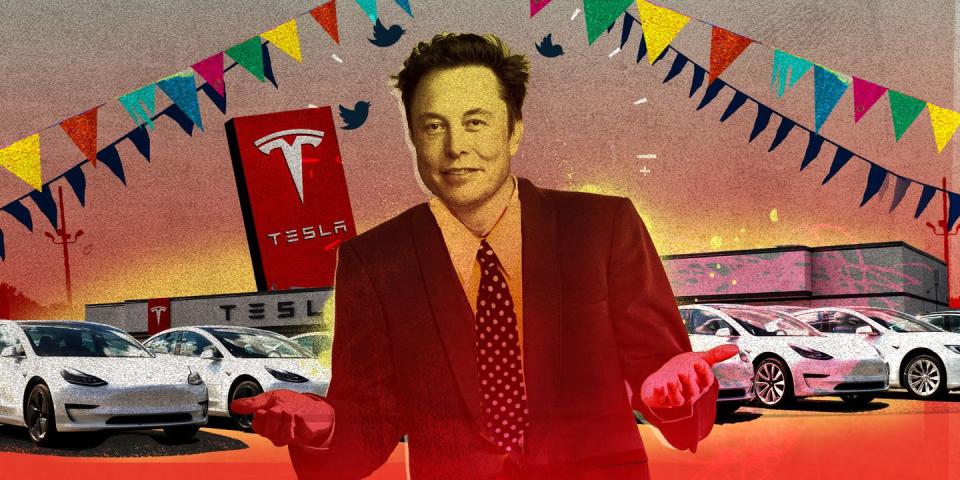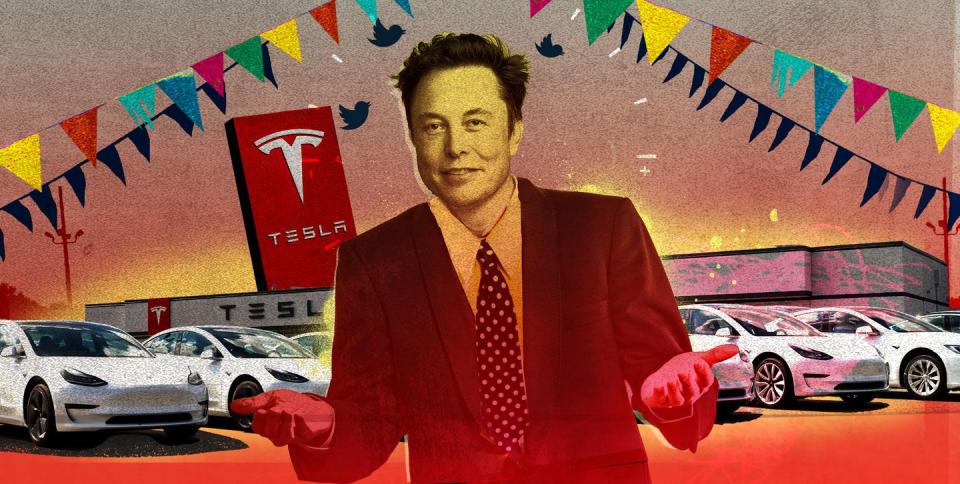Emperor Elon: Naked and Famous


For Elon Musk — the suddenly unclothed emperor of electric cars — it’s been a year to forget.
In barely one flip through a Pirelli calendar, Musk has seen his personal fortune shrink by $100 billion. The formerly trillion-dollar Tesla has seen $720 billion in shareholder value evaporate, tumbling to a $385-million market valuation. Musk shelled out $44 billion for Twitter, set it aflame, and now wears its carcass like an albatross flambé.
Like Scrooge in reverse, Musk has gone from one of the world’s most-admired tech visionaries to an increasingly bitter, bah-humbug crank: Laying off thousands of Twitter employees with unconcealed glee, while threatening the rest to Work harder, or else. Surveilling employees like a petty, paranoid tyrant. A CEO style as careening and unpredictable as a Tesla in Full Self-Driving mode. Dog whistling to the far right, while trolling the left and LGBTQ community with cringey tweets about pronouns or the “woke-mind virus.” Lashing out at Anthony Fauci and spreading pandemic misinformation, recalling the grudge match that drove Musk and Tesla’s spiteful departure from California.
Musk may be the Henry Ford of our Electric Age, but he’s starting to take the parallels a little too seriously: The guy seems one unhinged rant away from being canceled like Ye. But instead of stronger meds, what Musk clearly needs is a stronger Tesla Board of Directors: Some grown-ups to grow a spine and muzzle him — or sideline him completely — before it’s too late.
The saddest thing about this tale, not least for Tesla shareholders, is how preventable much of it was. Even as I whip up this steaming bowl of Schadenfreude, it’s worth recalling what the man has accomplished. See that F-150 Lightning whizzing by? That pickup would not exist without Musk. Ditto for Rivian, Lucid and other EV start-ups that rode Tesla’s coattails; or the global transportation revolution that’s now seeing an estimated $626 billion in EV and battery investment through 2030.
From Tesla’s near-magical technology to his own near-mythical image, Musk gave the world reasons to buy an electric car. He’s still doing that — only now he’s giving people reasons to buy a Ford, GM, VW or Rivian instead. Those rivals might consider paying Musk sales commissions, as they cheer his self-sabotage of a formerly Teflon-coated Tesla brand; as bizarrely as Musk walking the factory floor and keying every Tesla that rolls past.
Hal DeCoursey bought a Tesla Model Y last fall, after being blown away by driving a friend’s Model S.
“I floored it for the first time, and I was hooked,” says DeCoursey, a digital marketing manager for a gaming company in Rhode Island.
He still recommends the car, but nothing else about the Tesla experience, including “customer service that’s sorely lacking or non-existent. And our experiences certainly aren’t unique.”
As for the CEO’s misadventures, “Interesting decision-making on Musk’s part is the delicate way to put it,” DeCoursey says. “The car is great, but everything else really gives you pause to consider alternatives.”
Musk’s bratty antics, the eccentric-genius shtik, played better when Tesla was the only game in town. But Silicon Valley’s most beloved bedtime story, that of the Great Man, breaking all the rules, has suddenly turned Grimm. The past year has seen a slew of new EVs closing the competitive gaps, from the Lightning to the Hyundai Ioniq5, Kia EV6 and BMW iX.
Barely a year ago, DeCoursey says, “Tesla was still the clear standard bearer for EVs. The other manufacturers were coming along, but they couldn’t compete on features, the battery and range.
“That’s all changed in the past year and a half; there’s a lot more competition.”
That includes the Ford Mustang Mach-E, which DeCoursey’s mother will soon be driving, after canceling a Model Y order due to frustrating delays.

 Yahoo Autos
Yahoo Autos 